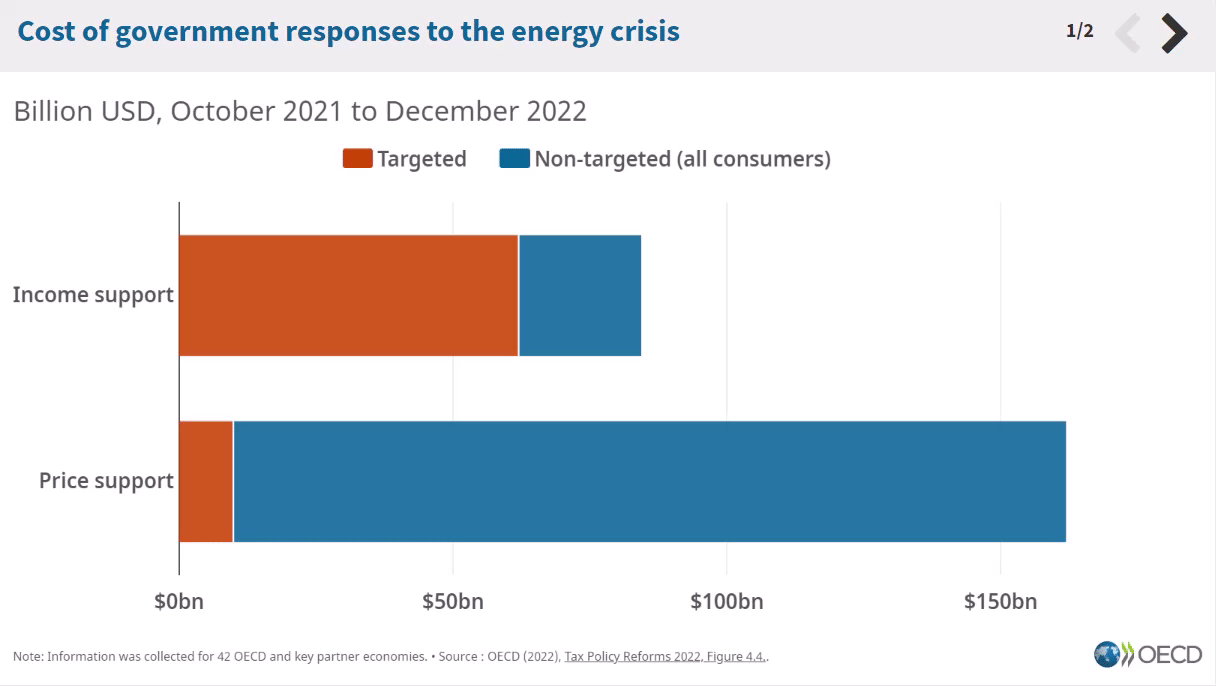
OECD Tax Responses to Coronavirus Crisis A Deep Dive
OECD tax responses to coronavirus crisis sets the stage for a fascinating look at how international tax policy adapted to the pandemic. This crisis forced a global reckoning, and the OECD played a pivotal role in coordinating responses among member nations. From temporary tax breaks to digital tax considerations, the OECD’s actions had significant impacts on member countries and the global economy.
This analysis delves into the OECD’s overall approach, specific tax measures, international cooperation, digitalization, and implications for member countries. We’ll explore the challenges faced, the effectiveness of various policies, and the potential long-term effects of these responses. Expect a comprehensive overview of the OECD’s efforts and a clear look at the evolving landscape of international taxation.
Overview of OECD Responses
The OECD played a crucial role in navigating the complex tax landscape during the coronavirus crisis. Recognizing the unprecedented economic disruption, the organization swiftly developed and disseminated guidance to member countries, aiming to mitigate the negative impacts on businesses and individuals while maintaining fiscal stability. Their approach prioritized international cooperation and consistency in tax policies, striving for a coordinated response across the globe.The OECD’s strategy focused on supporting member countries in adapting their tax systems to the evolving economic realities of the pandemic.
This included providing tailored recommendations for various sectors, from small businesses struggling with liquidity to healthcare systems facing increased demands. This proactive stance aimed to facilitate economic recovery and ensure a just and equitable distribution of the burden of the crisis.
OECD’s Tax Policy Recommendations
The OECD provided comprehensive guidance to member countries, encompassing various facets of tax policy. They offered recommendations for temporary tax relief measures, such as deferrals, reduced tax rates, and exemptions, to alleviate the financial strain on businesses and individuals. This support aimed to stabilize the economy and enable a faster recovery.
Key Areas of OECD Guidance
The OECD’s recommendations covered crucial areas like supporting small businesses, bolstering employment, and strengthening healthcare systems. Their initiatives focused on creating a supportive environment for economic recovery by providing tailored tax solutions to address specific needs.
Challenges in Coordinating Responses
Coordinating tax responses across diverse member nations presented considerable challenges. Varying national priorities, economic structures, and political contexts complicated the implementation of standardized solutions. The OECD had to navigate these differences while maintaining a common framework that ensured fairness and equity.
OECD Initiatives by Sector
| Sector | OECD Initiatives |
|---|---|
| Small Businesses | The OECD provided recommendations for temporary tax relief measures, including deferrals, reduced tax rates, and exemptions, designed to alleviate the financial burden on small businesses. These measures aimed to help them maintain operations and navigate the economic downturn. Examples include reducing corporate income tax rates for a specified period or providing grants for businesses with a certain number of employees. |
| Employment | The OECD emphasized the importance of maintaining employment levels during the crisis. They recommended measures to support workers, such as subsidies for wages and job retention programs. These initiatives aimed to prevent job losses and ensure economic stability. Examples included tax credits for employers who retain employees or financial incentives for workers to stay employed. |
| Healthcare | The OECD recognized the crucial role of healthcare systems during the pandemic. They suggested tax incentives for investments in healthcare infrastructure and workforce development to improve preparedness for future crises. This support aimed to enhance the capacity of healthcare systems to manage the pandemic’s impacts. Examples could include tax deductions for healthcare investments or incentives for medical professionals to work in underserved areas. |
Specific Tax Measures

The COVID-19 pandemic triggered a global economic crisis, prompting governments worldwide to implement various tax measures to mitigate its impact. OECD recommendations played a crucial role in shaping these responses, advocating for temporary reliefs and adjustments to support businesses and individuals. These measures aimed to stimulate economic activity, bolstering confidence and preventing a deeper recession.
Temporary Tax Breaks and Deferrals
OECD recommendations emphasized the importance of temporary tax breaks and deferrals to cushion the blow of the pandemic on businesses and individuals. These measures, while designed to be temporary, aimed to provide immediate relief during a period of economic uncertainty. The effectiveness of these measures varied significantly across countries, depending on the specific design of the policies, their implementation, and the overall economic context.
Effectiveness Across Countries
The effectiveness of temporary tax breaks and deferrals varied significantly across countries. Countries with robust social safety nets and well-structured tax systems often saw more successful outcomes in supporting businesses and individuals. For instance, countries that implemented generous wage subsidies or business grants saw a more pronounced impact on employment levels and business survival compared to countries with less comprehensive support programs.
Impact on Economic Sectors
These measures impacted various economic sectors differently. Sectors heavily reliant on consumer spending, such as retail and hospitality, experienced a more pronounced downturn and benefitted more directly from tax breaks and deferrals designed to stimulate consumption. On the other hand, sectors like technology and healthcare, while not immune to the pandemic’s impact, demonstrated greater resilience and experienced less immediate need for similar measures.
Table of Specific Tax Measures
| Tax Measure | Duration | Eligibility Criteria | Impact on Low-Income Families |
|---|---|---|---|
| Temporary Income Tax Reduction | 12 months | Businesses with revenue below a certain threshold | Indirect benefit through business survival and employment |
| VAT reduction on essential goods | 6 months | All consumers | Direct benefit as essential goods become more affordable |
| Deferral of tax payments | 3 months | Businesses and individuals experiencing financial hardship | Reduced immediate financial burden, allowing for better cash flow management |
| Enhanced Child Tax Credits | 18 months | Families with dependent children | Direct financial support, mitigating the impact of reduced income |
International Cooperation: Oecd Tax Responses To Coronavirus Crisis
The COVID-19 pandemic highlighted the critical need for international cooperation in addressing global crises, particularly in the realm of taxation. The OECD, recognizing this, played a pivotal role in coordinating responses to the economic fallout, ensuring a more unified and effective approach to tax challenges. This involved not only sharing best practices but also developing collaborative strategies to mitigate the economic impact of the crisis.The OECD’s approach to international tax cooperation during the pandemic was not merely reactive; it was proactive, anticipating potential issues and formulating solutions in advance.
This foresight, combined with the sharing of information and best practices, was instrumental in streamlining responses across member countries, fostering a more coordinated global approach to taxation. This was crucial in minimizing economic disruption and ensuring a more stable global economic environment.
Role of International Standards
The OECD leverages international standards to guide and harmonize tax policies among its member countries. These standards provide a common framework for tax administration and enforcement, which is essential for combating tax avoidance and ensuring fair taxation globally. These standards also facilitate the exchange of information between tax authorities, a key component of effective international cooperation.
Mechanisms for Communication and Collaboration
The OECD employs various mechanisms to facilitate communication and collaboration among member countries. These include regular meetings, workshops, and the provision of technical assistance to developing countries. These efforts help ensure that member countries have the resources and knowledge to effectively implement tax policies and address challenges collaboratively. The OECD’s dedicated working groups and committees play a crucial role in these initiatives.
These groups facilitate the development of common approaches and the sharing of best practices among members, ultimately leading to a more harmonized global tax environment.
Impact of International Cooperation, Oecd tax responses to coronavirus crisis
International cooperation significantly impacted the effectiveness of tax responses during the pandemic. By sharing information and best practices, countries could adapt policies quickly and efficiently, avoiding a chaotic or fragmented approach. This coordination prevented a race to the bottom in tax policies, which could have undermined the global economic recovery. Furthermore, international cooperation helped countries address the challenges of cross-border transactions and ensure that tax burdens were distributed fairly.
A shared understanding of the challenges and solutions ensured a more cohesive global response.
Comparison of Approaches to International Tax Cooperation
| Approach | Description | Strengths | Weaknesses |
|---|---|---|---|
| Mutual Agreement Procedures (MAPs) | Formal mechanism for resolving tax disputes between countries. | Provides a structured approach to resolving issues. | Can be time-consuming and complex. |
| Common Reporting Standard (CRS) | Global standard for automatic exchange of financial account information. | Facilitates the detection of tax evasion and avoidance. | Requires significant investment in infrastructure and expertise. |
| Base Erosion and Profit Shifting (BEPS) | Set of measures to address the tax challenges posed by multinational enterprises. | Addresses a key challenge in international taxation. | Implementation can vary across countries, requiring ongoing monitoring and adjustment. |
This table highlights the diverse approaches to international tax cooperation, showcasing their respective strengths and weaknesses. Each approach plays a unique role in creating a more effective and equitable global tax system. The effectiveness of each method depends on factors such as the specific context, the resources available, and the willingness of countries to cooperate.
Digitalization and Tax Policy
The COVID-19 crisis accelerated digitalization across various sectors, profoundly impacting the global economy. This shift has also introduced complex challenges for traditional tax systems, which often struggle to adapt to the nuances of the digital economy. The OECD recognized this imperative and responded with initiatives aimed at adjusting tax policies to accommodate the new landscape.The OECD’s response to digitalization in tax policy is multifaceted, focusing on ensuring a level playing field for businesses operating in the digital sphere while also addressing revenue loss and potential tax avoidance.
This involves adapting existing tax rules and creating new ones to account for the unique features of digital businesses and transactions. The aim is to create a robust and equitable tax framework that supports economic growth in the digital age.
OECD’s Incorporation of Digitalization Trends
The OECD actively engaged in developing frameworks to accommodate the increasing prevalence of digital business models. This involved thorough analysis of the challenges and opportunities presented by the digital economy and consultation with various stakeholders. The organization recognized the need for a global approach to address cross-border digital transactions, preventing tax avoidance and ensuring fair taxation.
OECD Efforts to Adapt Tax Policies
The OECD has undertaken significant efforts to adapt its tax policies to the evolving digital landscape. These efforts include the development of new guidelines and recommendations for tax authorities, aiming to provide clear and consistent standards for taxing digital activities. This approach seeks to mitigate the risks of tax avoidance by digital businesses and ensure that they contribute fairly to the economies in which they operate.
Challenges Posed by the Digital Economy to Traditional Tax Systems
Traditional tax systems often struggle to capture the income generated by digital businesses due to the complexity of cross-border transactions and the decentralized nature of digital platforms. The lack of physical presence in certain jurisdictions makes it difficult to apply conventional tax rules. This often leads to revenue losses for governments and creates an uneven playing field for businesses operating in the physical world.
Furthermore, the rapid pace of technological innovation in the digital sphere often outpaces the ability of tax systems to keep pace.
Digital Tax Measures and Policies Recommended by the OECD
| Measure/Policy | Description |
|---|---|
| Digital Services Tax (DST) | DSTs are national-level taxes imposed on the revenue of large digital companies, often targeting those with significant online presence and user base. |
| Minimum Global Tax Rules | These rules aim to ensure that multinational companies pay a minimum level of tax globally, regardless of their location of operations. This is aimed at preventing tax avoidance through artificial structuring of operations and revenue streams. |
| Transfer Pricing Guidelines | These guidelines provide principles for determining the appropriate pricing of transactions between related entities, particularly important for digital businesses operating in multiple jurisdictions. They help ensure that transactions are not artificially structured to avoid tax obligations. |
| International Cooperation on Tax Information Exchange | This involves facilitating the sharing of tax information between countries, crucial for combating tax evasion by digital businesses operating across borders. Enhanced cooperation among tax authorities can help identify and prevent avoidance strategies. |
Implications for Member Countries
The OECD’s responses to the coronavirus crisis, encompassing tax measures, international cooperation, and digitalization, profoundly impacted member countries. These responses, while intended to mitigate economic fallout, have introduced new complexities and challenges to national tax systems, prompting varied implementations and outcomes across the globe. Analyzing these effects is crucial to understanding the long-term implications and shaping future policy.The global economic shock of the pandemic necessitated swift and coordinated action from governments worldwide.
The OECD, acting as a platform for collaboration, provided guidance and recommendations on various tax strategies. These ranged from temporary tax relief measures to adjustments in international tax rules, aiming to stimulate economies and support businesses and individuals.
Impact on National Tax Systems
The OECD’s recommendations prompted significant changes in national tax systems. Member countries implemented various tax relief measures, including deferrals of tax payments, temporary reductions in corporate taxes, and adjustments to income tax brackets. These measures were intended to cushion the blow of economic hardship, but they also brought about new challenges. Long-term implications include the potential for increased public debt, shifting tax burdens, and alterations in the revenue streams of national treasuries.
Variations in Implementation and Outcomes
Implementation of OECD’s recommendations varied substantially across member countries. Factors such as pre-existing fiscal conditions, political landscapes, and societal priorities influenced how member countries adapted the OECD’s advice to their specific contexts. Some countries, with robust fiscal positions, were able to implement broad tax relief packages, while others, facing financial constraints, adopted more targeted approaches. The results of these varying strategies are still unfolding, and it’s important to analyze their impacts on economic recovery and long-term sustainability.
Implementation and Specific Results in Selected Member Countries
| Country | OECD Recommendation | Implementation | Specific Results |
|---|---|---|---|
| United States | Temporary reductions in corporate tax rates | Implementation through various legislation. | Stimulated business activity, but debate arose regarding the extent of the impact. |
| Germany | Targeted support for small and medium-sized enterprises (SMEs) | Expanded existing support programs and introduced new initiatives. | Showed positive results in preserving employment and business continuity. |
| France | Deferral of tax payments for businesses | Widespread application, coupled with specific conditions. | Provided temporary relief to businesses, potentially delaying full tax collection. |
The table above highlights examples of OECD recommendations and their implementation in select countries. Each country’s approach was influenced by their unique economic conditions and political priorities. The long-term effects on public finances and the overall economy require further monitoring and analysis.
Future Considerations

The OECD’s response to the coronavirus crisis has highlighted its crucial role in global tax policy coordination. Moving forward, the organization must adapt to the evolving global economic landscape and the long-term consequences of the pandemic. This necessitates a proactive approach to shaping future tax policies, recognizing both the opportunities and challenges presented by this new era.
The OECD’s Future Role in Shaping Tax Policy
The OECD’s future role in shaping tax policy will be significantly influenced by the evolving global economic landscape. The organization’s capacity to foster international cooperation, promote transparency, and address the challenges of digitalization will be paramount. Maintaining a strong focus on fair and efficient tax systems, adapted to the digital economy and the post-pandemic world, will be critical.
The OECD can leverage its existing expertise and networks to create a more just and sustainable global tax system. This includes addressing issues like base erosion and profit shifting (BEPS) in a dynamic and evolving context.
Potential Challenges and Opportunities for the OECD
The global economic landscape is undergoing rapid transformations, presenting both challenges and opportunities for the OECD. Challenges include the increasing complexity of the digital economy, the rise of multinational enterprises with intricate global operations, and the growing need for international cooperation to address tax avoidance and evasion. Opportunities include the potential for enhanced tax transparency and the use of digital technologies to improve tax administration and compliance.
The OECD must effectively leverage technological advancements and international cooperation to address these evolving complexities. For example, the development and implementation of new tax rules for digital businesses will be crucial.
Necessity of Future Adjustments in Tax Policies
Long-term economic changes necessitate adjustments in tax policies. The shift towards a more digitalized economy requires new approaches to tax collection and administration. Furthermore, the pandemic’s impact on employment patterns, income distribution, and the global economy requires adaptable tax policies that can mitigate negative effects and promote economic recovery. The focus should be on fostering economic resilience, promoting sustainable development, and ensuring fairness in the tax system.
For instance, adjustments to corporate tax rates, especially for digital businesses, may become necessary.
Key Takeaways and Future Implications
| Key Takeaway | Future Implications |
|---|---|
| The OECD’s continued commitment to international cooperation is vital for shaping a fair and effective global tax system. | Enhanced international dialogue and collaboration will be crucial in addressing global tax challenges. |
| Adaptability to the evolving digital economy is essential for effective tax policies. | The development of innovative tax policies to address the unique challenges of the digital economy is required. |
| The pandemic’s long-term impact on economic structures necessitates adjusted tax policies. | Tax policies should be reviewed and revised to account for the changes in economic structures, employment patterns, and income distribution. |
| Promoting transparency and combating tax evasion remains a crucial objective. | Strengthened international cooperation and data exchange will be necessary to enhance tax transparency and combat tax evasion. |
Outcome Summary

In conclusion, the OECD’s tax responses to the coronavirus crisis were a complex and multifaceted endeavor. While offering valuable guidance and measures, the effectiveness and implementation varied considerably across nations. The pandemic underscored the importance of international cooperation and adaptability in tax policy. This analysis highlights the challenges and opportunities that lie ahead as the global economy continues to evolve, and the OECD navigates the evolving digital landscape in shaping future tax policies.





